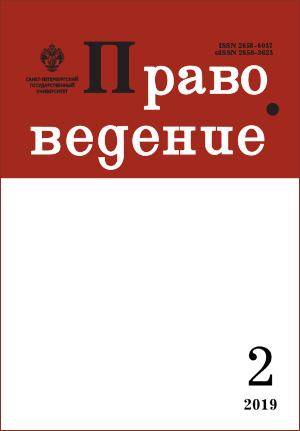Amendment of the rules of qualification and purpose of punishment for corruption crimes under criminal law of the People’s Republic of China
DOI:
https://doi.org/10.21638/spbu25.2019.202Abstract
In this article, the authors analyze the norms of criminal law in relation to corruption behavior in China, paying attention to the fact that these norms are one of the key elements of several stages of changes in the Criminal Code of China. Thus, the Ninth Amendment to the Criminal Code of China in 2015 marks a new level in the field of combating corruption crimes and demonstrates the countermeasures of the central government of China in this area. The publication of Joint Explanations on some issues of the application of laws in criminal cases related to corruption of the Supreme People’s Court of People’s Republic of China (PRC) and the Supreme People’s Prosecutor’s Office of China from 2016 further explained the regulations about the size of bribes, the circumstances of the case, and the mitigation of punishment for crimes related to corruption, but it also played an important role in law-enforcement practices in cases related to corruption. In particular, a clear correlation was established between the rules of qualification and sentencing for corruption crimes in relation to the circumstances of the case. The authors conclude that in addition to the death penalty, the current criminal policy of China provides for the use of life imprisonment, which constantly hangs with the “sword of Damocles” and has a preventive effect on officials who have not yet solved the moral dilemma. The authors note that in the criminal policy of the PRC there are still some rough edges and controversial approaches, in particular, the question of mitigation of punishment, its correlation with the public danger of an illegal act, etc. The article provides a content analysis of the Ninth Amendement and Joint Explanations, which proposed a number of new approaches based on the theoretical provisions of criminal law to the prevention of corruption crimes. In conclusion, the authors state that the severity of punishment in China is not an end in itself, it is subject to other value aspirations. The decline in the use of the death penalty was therefore an international trend, and the approach to the absolute use of the death penalty for corruption and bribery in China had been changed to a relative one, taking into account the circumstances of the case.
Keywords:
corruption, bribe, Chinese legislation, legal clarifications, rules for qualifying a crime, sentencing
Downloads
References
References
Akhmetshin, Hasan M., Akmetshin, Nail’ H., Petukhov, Artem A. 2000. Modern criminal legislation of the PRC. Moscow, Muravei Publ. (In Russian)
Berger, Jakov M. 2009. Economic strategy of China. Moscow, Forum Publ. (In Russian)
Fedorov, Aleksandr V. 2014. Criminal liability of legal entities for corruption crimes in the people’s Republic of China. Uchenye zapiski Sankt-Peterburgskogo imeni V.B.Bobkova filiala Rossiiskoi tamozhennoi akademii, 4: 92–102. (In Russian)
Gudoshnikov, Leonid M. (ed.). 1988. The state system of the people’s Republic of China. Moscow, Nauka’, Glavnaia redaktsiia vostochnoi literatury Publ. (In Russian)
Hu, Yunteng. 2015. Theoretical and practical innovations of the Ninth amendment to the criminal code of the PRC. Zhōnghuá rénmín gònghéguó xíngfǎ de lǐjiě yǔ shìyòng, ed. by Tszai Lanshen. Minijuego Publ. (In Chinese)
Khabrieva, Taliya Y. (ed.). 2012. Corruption: nature, manifestation, and counteraction: monograph. Moscow, Iurisprudentsiia Publ. (In Russian)
Korobeev, Alexander I. (ed.). 2001. Criminal code of the people’s Republic of China. St. Petersburg, Iuridicheskii tsentr Press Publ. (In Russian)
Kumanin, Evgenii V. 1990. Legal policy and legal system of the People’s Republic of China. Moscow, Nauka Publ. (In Russian)
Liu, Kh. 2017. Systemic reform of Chinese anti-corruption legislation and law enforcement practices. Pravoprimenenie 1 (4): 140–147. (In Russian)
Luzianin, Sergei G., Troshchinskii, Pavel V., Suhodolov, Jakov A. 2016. Features of legal regulation of the fight against crime in China. All-Russian journal of criminology 10 (4): 812–824. (In Russian)
Pan, Dunmei. 2019. Theory of criminal liability of legal entities in China. Ugolovnoe pravo 2: 30–35. (In Russian)
Prozumentov, Lev M., Shesler, Aleksandr V. 2014. Domestic scientific concepts of the causes of crime. Kriminologicheskii zhurnal Baikal’skogo gosudarstvennogo universiteta ekonomiki i prava 1: 49–58. (In Russian)
Seval’nev, Viacheslav V. 2017. Anti-corruption Legislation: Russia and China (comparative legal aspect). Zhurnal zarubezhnogo zakonodatel’stva i sravnitel’nogo pravovedeniia, 64: 95–100. (In Russian)
Troshchinskii, Pavel V. 2016. Modern legislation of the PRC: problems and prospects of development. Zhurnal zarubezhnogo zakonodatel’stva i sravnitel’nogo pravovedeniia 3 (58): 24–31. (In Russian)
Truntsevskii, Iurii V., Seval’nev, Viacheslav V., Sukharenko, Aleksandr N. 2019. Anti-corruption in China: legislation and law enforcement. Moscow, Prospekt Publ. (In Russian)
Utkin, Vladimir A. 2018. Problems of the theory of criminal penalties: a course of lectures. Tomsk, Tomskii gosudarstvennyi universitet Publ. (In Russian)
Veselova, Liudmila S. 2014. Informal relations (Guanxi) — manifestations of corruption or cultural specificity of China? Istoricheskie, filosofskie, politicheskie i iuridicheskie nauki, kul’turologiia I iskusstvovedenie. Voprosy teorii i praktiki 7 (45, II): 32–36. (In Russian)
Vlasov, Il’ia S. (ed.). 2014. Criminal law measures to counteract corruption abroad: a comparative legal study. Moscow, Institute of legislation and comparative law under the Government of the Russian Federation Publ. (In Russian)
Wang, Mengyao. 2016. After the 18th CPC Congress, 80 % of major corruption cases occurred in 2012–2015. Sin’czin’bao 26 February (In Chinese)
Zhao, Binzhi. 2016. Understanding and applying the Ninth amendment to the criminal code of the People’s Republic of China. Fazhi Publ. (In Chinese)
Downloads
Published
How to Cite
Issue
Section
License
Articles of "Pravovedenie" are open access distributed under the terms of the License Agreement with Saint Petersburg State University, which permits to the authors unrestricted distribution and self-archiving free of charge.




